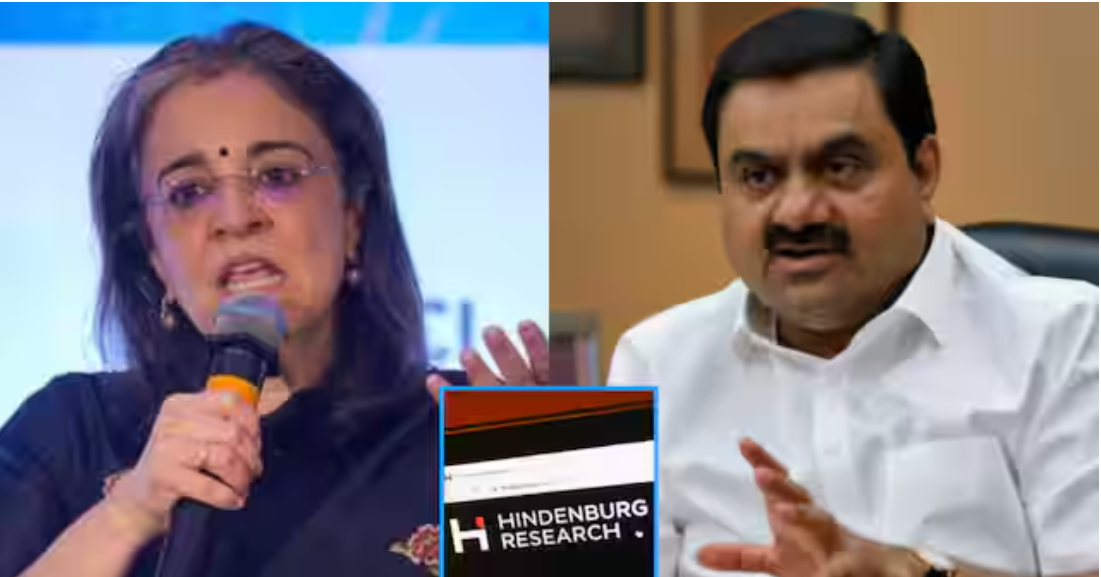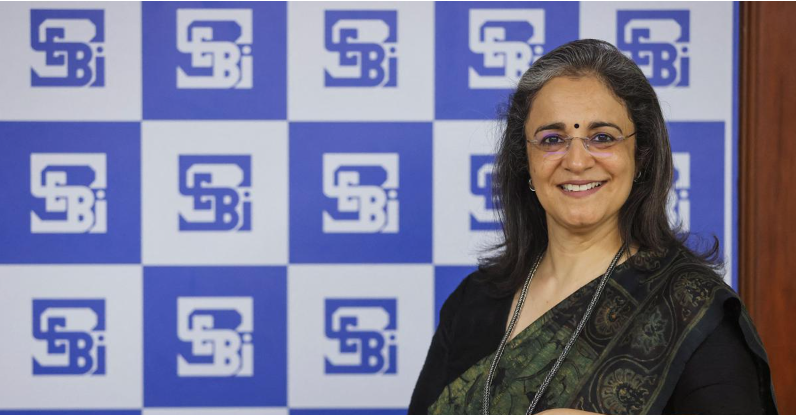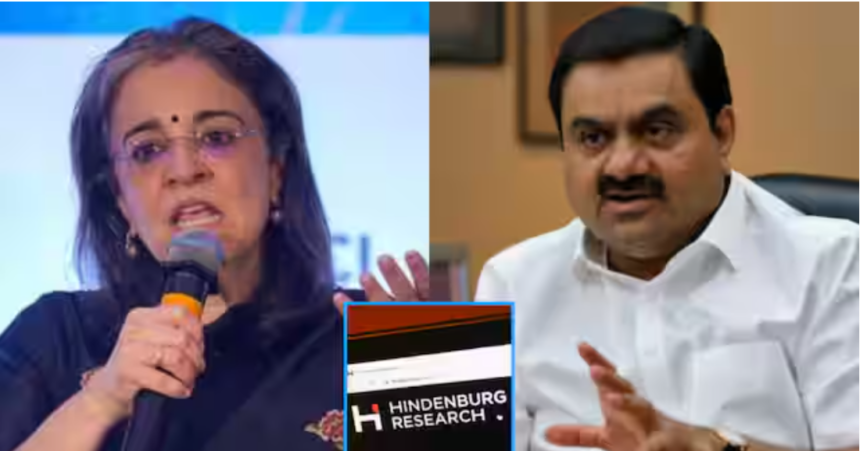SEBI Chief Had Stake in Funds Tied to Adani:-
SEBI Chief in the world of finance and corporate governance, transparency and accountability are the cornerstones of trust. When these principles are called into question, the repercussions can be far-reaching, not just for the individuals or companies involved, but for the entire market. A recent report by Hindenburg Research has done just that, shaking the foundations of India’s financial regulatory environment. The report alleges that the Chairman of the Securities and Exchange Board of India (SEBI), the country’s top market regulator, had a stake in funds tied to the Adani Group, one of India’s largest conglomerates. This revelation has sparked a major controversy, raising questions about potential conflicts of interest, regulatory integrity, and the broader implications for India’s corporate governance landscape.
The Allegations: A Summary of the Hindenburg Report
Hindenburg Research, a U.S.-based investment research firm known for its critical reports on companies and institutions, released a detailed investigation alleging that the SEBI Chief, who is supposed to oversee the fairness and transparency of the financial markets, had personal financial interests in funds linked to the Adani Group. The Adani Group, led by billionaire Gautam Adani, has been at the center of numerous controversies, including accusations of environmental violations, labor rights abuses, and corporate governance lapses.
Key Points of the Report
- Undisclosed Financial Interests: The Hindenburg report claims that the SEBI Chief had invested in mutual funds and other financial instruments that were heavily exposed to Adani Group stocks. These investments, according to the report, were not disclosed in the mandatory filings required by Indian law, raising concerns about a possible conflict of interest.
- Potential Regulatory Bias: The report suggests that the SEBI Chief’s financial interests may have influenced the regulatory body’s oversight of the Adani Group. It questions whether SEBI’s actions (or inactions) regarding investigations into the Adani Group were compromised by the Chairman’s personal financial stake in the conglomerate.
- Opaque Financial Structures: Hindenburg Research also points out that the funds in question were linked to offshore entities with complex and opaque ownership structures. The report argues that this lack of transparency makes it difficult to ascertain the true nature of the SEBI Chief’s investments and whether they were intended to hide conflicts of interest.
- Implications for Market Integrity: The report emphasizes that the credibility of SEBI, as the regulator of India’s capital markets, is at stake. If the allegations are true, they could undermine investor confidence in the fairness and integrity of the Indian financial system.
The Adani Group: A Corporate Giant Under Scrutiny
The Adani Group, with interests spanning infrastructure, energy, logistics, agribusiness, and more, is one of India’s most powerful and influential conglomerates. Over the years, the group has expanded rapidly, often with the support of favorable government policies and financing. However, this growth has not been without controversy.  for more information click on this link
for more information click on this link
A History of Allegations
The Adani Group has faced numerous allegations related to environmental degradation, human rights violations, and monopolistic practices. Critics have accused the group of using its political connections to secure favorable treatment, including access to public resources and regulatory leniency.
In recent years, the Adani Group has also been the subject of scrutiny over its corporate governance practices. Concerns have been raised about the group’s opaque ownership structures, particularly in its offshore entities, and its complex financial dealings. These concerns have led to calls for greater transparency and regulatory oversight.
The Group’s Response
The Adani Group has consistently denied any wrongdoing and has defended its business practices. The conglomerate argues that it operates within the bounds of the law and that it has contributed significantly to India’s economic growth and development. In response to the Hindenburg report, SEBI Chief the Adani Group issued a statement rejecting the allegations and accusing the research firm of attempting to manipulate the market and damage its reputation.
SEBI’s Role and Responsibilities: A Question of Integrity
The Securities and Exchange Board of India (SEBI) is the primary regulatory authority for the securities and capital markets in India. Its mandate includes protecting investor interests, promoting and regulating the securities market, SEBI Chief and enforcing securities laws. As such, SEBI plays a critical role in ensuring the integrity and transparency of India’s financial markets.
The Importance of Independence
For a regulatory body like SEBI to function effectively, SEBI Chief it must be independent and free from any external influences, whether political or financial. The integrity of SEBI is essential for maintaining investor confidence and ensuring that the markets operate fairly and transparently.
The allegations against the SEBI Chief raise serious concerns about the regulator’s independence. If the Chairman of SEBI has a personal financial stake in entities that the regulator oversees, it could lead to a conflict of interest that compromises the regulator’s ability to enforce the law impartially.
The Need for Transparency
Transparency is a key principle of good governance, both for corporations and regulatory bodies. SEBI, as the guardian of India’s capital markets, SEBI Chief must adhere to the highest standards of transparency in its operations. This includes ensuring that its officials disclose any potential conflicts of interest and recuse themselves from matters where such conflicts may arise.
The Hindenburg report suggests that the SEBI Chief may have failed to disclose his financial interests, which, if true, would be a serious violation of these standards. The lack of transparency not only undermines the credibility of the individual involved but also casts a shadow over the entire regulatory body.
The Broader Implications: What Does This Mean for India’s Financial Markets?
The allegations against the SEBI Chief have far-reaching implications for India’s financial markets. If the claims are proven true, they could erode investor confidence in the regulatory framework that governs the markets. This could lead to increased volatility, SEBI Chief a loss of foreign investment, and a general perception that India’s markets are not as transparent or fair as they should be.
Investor Confidence
Investor confidence is a cornerstone of a well-functioning financial market. When investors believe that the markets are fair, transparent, and well-regulated, they are more likely to invest, leading to greater market stability and economic growth. However, SEBI Chief when confidence is shaken, it can lead to capital flight, market instability, and a slowdown in economic activity.
The Hindenburg report has the potential to shake investor confidence in India’s markets, particularly if the allegations against the SEBI Chief are substantiated. Investors may begin to question whether the regulatory environment in India is truly independent and whether their investments are being adequately protected.
Foreign Investment
India has been a major destination for foreign investment, attracting billions of dollars in capital from investors around the world. This investment has been crucial in driving economic growth and development. However, SEBI Chief foreign investors are particularly sensitive to issues of regulatory transparency and governance. Allegations of conflicts of interest and regulatory capture could make India a less attractive destination for foreign investment.
If the allegations against the SEBI Chief lead to a perception that India’s regulatory environment is compromised, it could deter foreign investors, SEBI Chief leading to a decline in capital inflows. This, in turn, could have a negative impact on the broader economy.
Corporate Governance in India
The Hindenburg report also raises broader questions about corporate governance in India. The alleged ties between the SEBI Chief and the Adani Group highlight the potential for conflicts of interest and the challenges of ensuring that regulatory bodies remain independent and free from undue influence.
India has made significant strides in improving corporate governance standards in recent years, with reforms aimed at enhancing transparency, accountability, SEBI Chief and investor protection. However, the allegations in the Hindenburg report suggest that there may still be gaps in the system that need to be addressed.
The Path Forward: What Needs to Happen Next?
In the wake of the Hindenburg report, there is a clear need for a thorough and transparent investigation into the allegations. This investigation should be conducted by an independent body with the authority to examine the financial interests of the SEBI Chief and any potential conflicts of interest.
Independent Investigation
An independent investigation is crucial to ensuring that the allegations are thoroughly examined and that any wrongdoing is uncovered. This investigation should not only focus on the SEBI Chief’s financial interests but also examine whether there has been any undue influence on the regulatory decisions made by SEBI.
If the investigation finds that the SEBI Chief did have undisclosed financial interests in funds tied to the Adani Group, it will be important to determine whether this led to any bias in the regulatory oversight of the conglomerate. The findings of the investigation should be made public, SEBI Chief and any individuals found to have acted improperly should be held accountable.  for more information click on this link
for more information click on this link
Strengthening Regulatory Oversight
The controversy surrounding the SEBI Chief underscores the need for stronger regulatory oversight in India. This includes ensuring that all regulatory officials are subject to strict disclosure requirements and that any potential conflicts of interest are identified and addressed promptly.
There should also be mechanisms in place to ensure that regulatory bodies like SEBI remain independent and free from external influence. This could involve implementing stricter rules around the financial interests of regulatory officials and enhancing the transparency of the regulatory process.
Rebuilding Confidence
Rebuilding investor confidence will be crucial in the wake of the Hindenburg report. This will require not only a thorough investigation and accountability for any wrongdoing but also broader efforts to strengthen the integrity and transparency of India’s financial markets.
The government and SEBI should take proactive steps to reassure investors that the regulatory environment in India remains robust and that their investments are protected. This could include reaffirming the importance of regulatory independence and committing to ongoing reforms aimed at enhancing transparency and accountability in the financial markets.
Conclusion: A Critical Moment for India’s Financial Markets
The allegations in the Hindenburg report have brought to light serious concerns about potential conflicts of interest within India’s financial regulatory system. If proven true, these allegations could have significant implications for investor confidence, SEBI Chief foreign investment, and the broader health of India’s financial markets.
This controversy represents a critical moment for India’s financial markets. It highlights the need for strong, independent regulatory oversight and the importance of transparency and accountability in maintaining market integrity. As the investigation unfolds, it will be important for all stakeholders, including the government, SEBI, and the corporate sector, to work together to address these issues and ensure that India’s financial markets continue to operate fairly and transparently.
The path forward will not be easy, but it is essential for safeguarding the future of India’s financial system and for maintaining the trust and confidence of investors both at home and abroad. ALSO READ:- Bangladesh Chief Justice Quits Hindus Seek Safety Amid Rising Tensions





